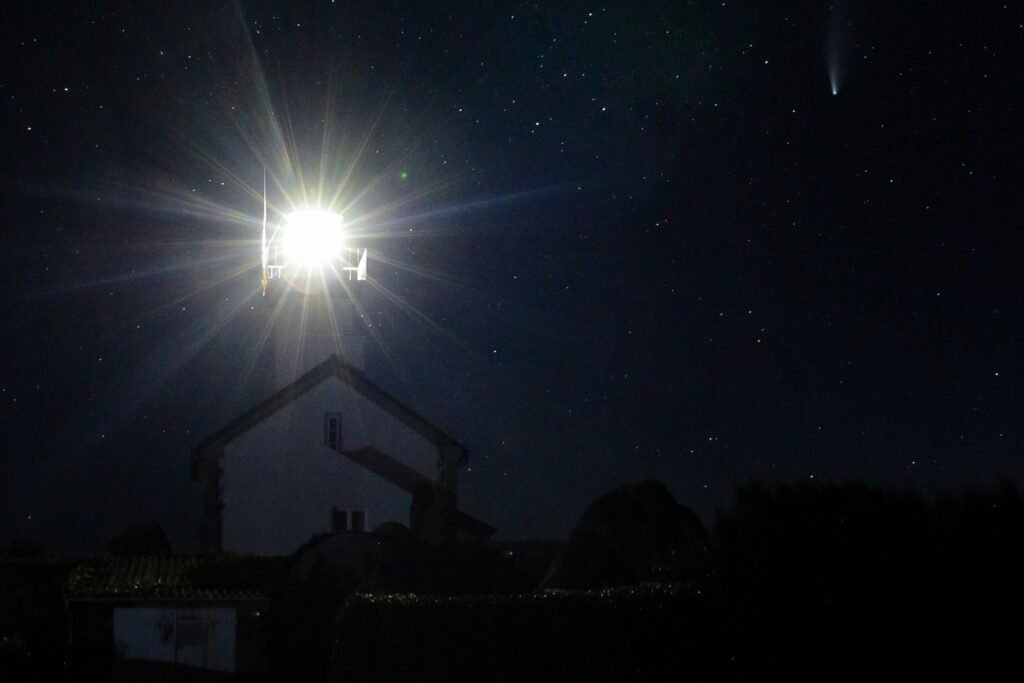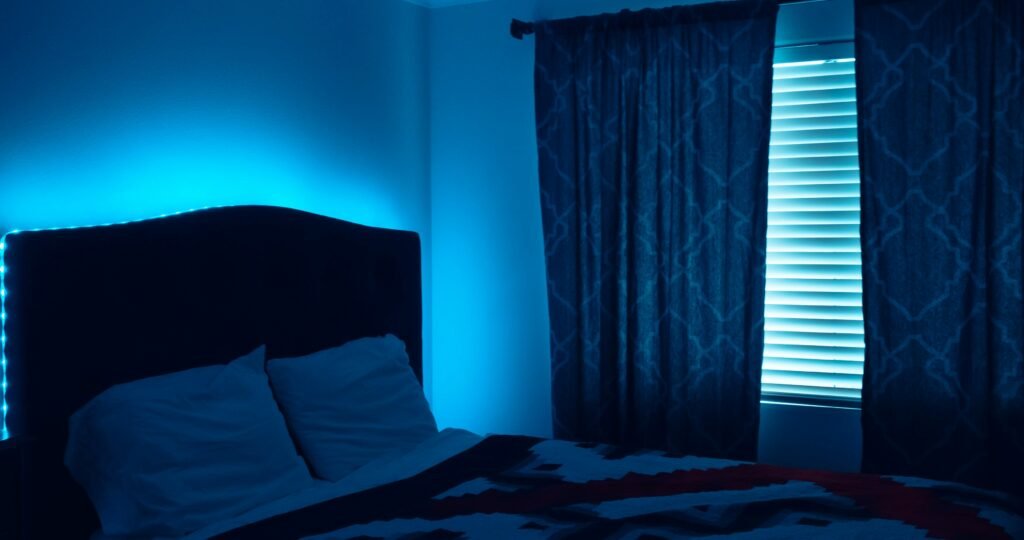The world is peaceful. The moon is out, the stars are twinkling, and lullabies sing softly as babies drift to sleep.
In most of the world, anyway.
At your house, you’re squinting hard trying to force your eyelids closed in the harshness of a spotlight glaring through your window. Your neighbor’s bright lights are buzzing like a maximum-security prison at night, making it feel like you’re trying to sleep on the surface of the sun. You toss and turn, groaning in frustration, wondering if you’ll ever rest again.
In this article, we’ll explore the impact of light pollution, how to approach your neighbor, and creative solutions to help you reclaim your night’s rest.
When a Neighbor’s Light is Too Bright
Blindingly bright lights from a neighbor’s house can be a significant intrusion, especially when they shine directly into your home. These lights can disrupt your natural sleep cycle, making it difficult to fall asleep or stay asleep throughout the night. The constant glare can cause eye strain and headaches, making it hard to relax in your own home.
Excessive light pollution can also impact your mental health, causing stress and anxiety. It can affect your daily routines, making it harder to enjoy your yard or patio, or even reading or watching television. If not addressed, the intrusion of bright lights can strain relationships between neighbors, leading to tensions and resentment.

Understanding Your Neighbor’s Perspective
While your neighbor’s lights might be causing you headaches, keep in mind they might have a reason for turning them on. If it’s early in the evening, for instance, your neighbor might be waiting for a loved one to return home, or expecting guests to arrive.
If your neighbor chooses to leave their lights on all night, they might be concerned about neighborhood safety or have experienced a recent break-in attempt. Whatever the reason, it’s important to talk to your neighbor to fully understand the situation.
Your neighbor might also be unaware of the impact their lights have on your property, and an honest, friendly conversation might be all it takes to solve the issue. When discussing the problem, be specific about how the bright lights affect you and your family, and avoid accusatory language that could put them on the defensive.
Don’t leave a note
While it might be tempting to leave a note for your neighbor, it’s generally not a good idea. Written communication can easily be misinterpreted, and it doesn’t allow for a two-way conversation. It’s always better to have a face-to-face discussion where you can express your concerns and listen to your neighbor’s perspective.
Be prepared to offer compromise solutions. For example, you could suggest that your neighbor uses motion sensor lights that only turn on when needed or that they adjust the angle of their lights to minimize the glare on your property.

Dealing with the Light
Reducing the impact on outdoor living spaces
When your neighbor’s bright lights are spilling into your outdoor living spaces, it can be challenging to enjoy your backyard or patio area. However, there are ways to reduce the impact of these lights and create a more pleasant atmosphere.
- Installing your own outdoor lighting can help counteract the glare from your neighbor’s lights. Consider using softer, warmer lighting options, such as string lights or lanterns, to create a cozy ambiance. You can also strategically place lights around your deck, patio or entertaining area to minimize the impact of your neighbor’s lights.
- Plant tall trees or shrubs along the property line to create a natural barrier that blocks the light. Evergreen trees, such as cypress or arborvitae, can provide year-round coverage and can grow tall enough to block out even the brightest lights. If you prefer a more decorative option, consider tall ornamental grasses or climbing vines on a trellis to create a living wall that blocks the light.
- Install a pergola or shade sail over your deck or patio. These structures can provide shade during the day and can also block out light at night. Add outdoor curtains or privacy screens to create a more intimate and light-free atmosphere.

Reducing the impact on your home’s interior
If your neighbor’s bright lights are shining into your home’s interior, one simple solution is to rearrange your furniture so that the lights don’t shine directly onto your bed or seating areas.
- Install light-blocking window film — a semi-permanent solution that helps to reduce glare and UV rays while still allowing natural light to enter your home during the day — or use heavy curtains to block out your neighbor’s light.
- Thick, lined curtains can provide excellent light-blocking capabilities, in addition to helping insulate your windows, reducing drafts and improving energy efficiency. Layer curtains with sheers or blinds to create a customized light-blocking solution that suits your needs and style preferences.
- Blackout curtains or shades can be a lifesaver in the bedroom, especially when it comes to getting a good night’s sleep. Curtains or shades made from thick, tightly woven fabrics prevent most light from passing through and can be easily installed on your existing curtain rods or mounted directly onto your window frames for a more seamless look.
- Consider using layered window treatments or a combination of sheer curtains and heavy drapes to customize the amount of light that enters the room. During the day, you can open the heavy drapes to allow natural light to enter, while at night, you can close them to block out any bright lights.
Sleeping Despite Your Neighbor’s Bright Lights
If all else fails, consider using a sleep mask to create a dark and quiet environment for sleeping. Sleep masks are designed to block out any remaining light that may be entering your bedroom, creating a pitch-black environment that’s ideal for sleep. They’re typically made from soft, lightweight materials that are comfortable to wear throughout the night.
While sleep masks are not ideal long-term solutions, they can provide temporary relief while you work on finding a more permanent solution to the bright light issue. They’re also a great option for when you’re traveling or staying in unfamiliar environments where you may not have control over the lighting or noise levels.
Dealing with a neighbor’s bright lights can be frustrating and challenging, but remember to approach your neighbor with kindness and respect.

